|
|
|
Sort Order |
|
|
|
Items / Page
|
|
|
|
|
|
|
| Srl | Item |
| 1 |
ID:
105863
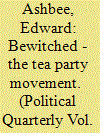

|
|
|
|
|
| Publication |
2011.
|
| Summary/Abstract |
This article considers the development of the Tea Party movement, the character of its thinking and the nature of the interests and constituencies to which it is tied. The article suggests that despite the importance of ideas and interests, and the process of interaction between them, the movement has also been shaped and energised by institutional arrangements. In particular, it argues that there are significant numbers of independent or 'detached' conservatives and that the institutional architecture draws them towards political engagement but at the same time imposes constraints. The political friction that this creates has contributed to the anger that has characterised the movement. While the Tea Party movement may, as such, have only an ephemeral existence, independent conservatives are likely to remain a significant and potent constituency and will, within the institutional structures that define the American political process, give rise to other movements and protests.
|
|
|
|
|
|
|
|
|
|
|
|
|
|
|
|
| 2 |
ID:
105871
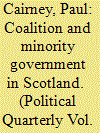

|
|
|
|
|
| Publication |
2011.
|
| Summary/Abstract |
The United Kingdom general election result in 2010 produced a hung or balanced parliament for the first time in over three decades. Since the United Kingdom has limited postwar experience of this outcome, it is natural that commentators have begun to look elsewhere for lessons on the practicalities of minority and coalition government. This article considers the lessons we can learn from the Scottish parliamentary experience since 1999. It outlines two main points of comparison: strength and stability. One might assume that coalition provides more of both than minority government. Indeed, for that reason, it is rare for central or devolved governments in the United Kingdom to operate as minorities through choice. Yet, the Scottish experience shows that the differences between coalition and minority government are not completely straightforward. Much depends on the institutional context and, in many cases, idiosyncratic elements of particular systems. Consequently, one can identify a trade-off in comparative analysis: as the identification of elements specific to one system increases, the ability to draw clear meaningful lessons decreases.
|
|
|
|
|
|
|
|
|
|
|
|
|
|
|
|
| 3 |
ID:
105872
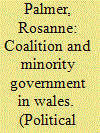

|
|
|
|
|
| Publication |
2011.
|
| Summary/Abstract |
Post-devolution Wales has had experience of a variety of different types of government and a variety of different parties in government; single party rule with one party gaining an overall majority of the seats (Labour, 2003-05), minority administrations (Labour, 1999-2000, 2005-07) and coalitions between Labour and the Liberal Democrats (2000-03) and Labour and Plaid Cymru (2007 to date). This article explores the experiences of both minority and coalition government in Wales, focusing most notably on the convoluted process of coalition formation in 2007, before proceeding to draw lessons for the United Kingdom coalition government based upon developments in Wales.
|
|
|
|
|
|
|
|
|
|
|
|
|
|
|
|
| 4 |
ID:
105865
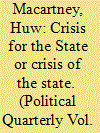

|
|
|
|
|
| Publication |
2011.
|
| Summary/Abstract |
The Conservative-Liberal Democrat government's policy risks turning the financial crisis into a crisis of the state. This article argues that the current trajectory of the British state risks exacerbating the very social antagonisms which it has fought so hard to contain in recent years. It contends that the crisis (2007-09) was a crisis of neoliberalism and yet, paradoxically, neoliberalism-in the form of further depoliticisation and a new politics of debt-is being re-invoked to deal with the post-apocalyptic condition of the British economy. The article suggests that the state lacks the necessary political discourse to secure popular consent and-as a result-is resorting to a more coercive form of political management; and that the effects of austerity are being offset through an increased indebtedness of the British public. Both risk igniting social conflict. In the conclusion several points are indicated for an alternative political agenda.
|
|
|
|
|
|
|
|
|
|
|
|
|
|
|
|
| 5 |
ID:
105866
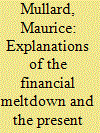

|
|
|
|
|
| Publication |
2011.
|
| Summary/Abstract |
he concern of this article is to locate the unfolding literature that seeks to explain the present financial crisis into three dimensions of contestability. The major areas of disagreements between various authors include: the role of government; the issues of whether the recession was unavoidable or whether it was inevitable; and the area of ideas and ideals and how economic ideas shaped and influenced the policy process. These explanations include the pragmatists and all that literature that had a time dimension of major actors trying to produce policies that aimed to stabilise the financial markets. These policy makers did not have the benefit of hindsight but were concerned that the financial markets were so fragile that there was no other choice but for governments to intervene. By contrast, there were the market fundamentalists who argued that the pragmatists had got it wrong and were therefore highly critical of the Federal Reserve and the Treasury and tended to blame the recession on government housing policy. Institutionalists have argued that the regulatory system is broken, while structuralists tend to focus on growing income inequalities, the concentration of wealth and how the changing structure explains the recession in the sense that households took the avenue of higher debt on their homes to sustain higher levels of consumption. Finally, there is the Keynesian Collectivist argument that points to the limits of Rational Expectations and Efficient markets. No one really know who is right, but the fierce debate that is emerging is highly important in that each explanation seeks to provide a framework for policy making
|
|
|
|
|
|
|
|
|
|
|
|
|
|
|
|
| 6 |
ID:
105873
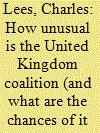

|
|
|
|
|
| Publication |
2011.
|
| Summary/Abstract |
This article draws upon insights from theoretical and empirical studies of coalition behaviour in multiparty politics to examine the formation of the United Kingdom coalition following the general election of 6 May 2010. It argues that the formation of the Conservative-Liberal Democrat coalition is not unusual in historical terms or in the context of contemporary European politics; and that although it is a break from the more recent pattern of postwar British politics it nevertheless does conform to expectations in the light of the coalition literature. The article also provides a comparative analysis of the impact of Britain's 'First-Past-The-Post' (FPTP) electoral system on party competition and an examination of the performance of the Alternative Vote (AV) system and argues that if the United Kingdom retains FPTP then a return to single-party government in 2015 is highly likely; and it is not inevitable that the introduction of AV would significantly advantage the Liberal Democrats.
|
|
|
|
|
|
|
|
|
|
|
|
|
|
|
|
| 7 |
ID:
105869
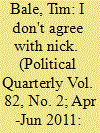

|
|
|
|
|
| Publication |
2011.
|
| Summary/Abstract |
Insider and journalistic accounts of the formation in May 2010 of the Conservative-Liberal Democrat coalition actually, although not explicitly, rely on types of explanation familiar to those who study politics. They tell us that structure (or at least the economy) was important. So too, they suggest, were institutions (timing and the rules of the game). They also stress the importance of contingency ('events, dear boy, events') and agency (who did and said what to whom). While none of these things were unimportant, they only served to make certain an outcome that anyone with a passing acquaintance with the theory and the practice of coalition formation would have predicted-namely a 'minimum winning coalition'. The only thing that could have made that outcome uncertain was a fundamental ideological difference between the two parties involved; however, it quickly became apparent-to the surprise of those of us who failed to appreciate how much the Liberal Democrats had changed-that no such difference existed. Indeed, it is possible to argue that the coalition formed was not merely minimum winning but 'minimum connected winning'. As such, its formation was not so much breathtakingly bold and exciting as pretty much inevitable. In the end, the maths and the physics mattered more than the chemistry. Fortunately for the Conservatives, the Liberal Democrats seriously underplayed their hand in the negotiations, with possibly disastrous consequences for them in the long term.
|
|
|
|
|
|
|
|
|
|
|
|
|
|
|
|
| 8 |
ID:
105864


|
|
|
|
|
| Publication |
2011.
|
| Summary/Abstract |
The regulation of party political funding and expenditure in the United Kingdom is an issue of continuing political and public debate. Campaign expenditure by candidates has been regulated since the late nineteenth century, but this has applied only during the short campaign period between the dissolution of Parliament and polling day. Concerns have been raised about earlier expenditure levels, but these were not regulated until legislation in 2009 which limits the amount that candidates can spend in the months prior to Parliament's dissolution-in 2010 this covered the period between 1 January and 15 April: the election was held on 6 May. The Electoral Commission has released information on all candidates who made a return of their expenditure during both periods. This article provides descriptive data on those amounts, by party and type of constituency, plus analyses which show that the more that a party spent the better its performance at the polls.
|
|
|
|
|
|
|
|
|
|
|
|
|
|
|
|
| 9 |
ID:
105868


|
|
|
|
|
| Publication |
2011.
|
| Summary/Abstract |
One of the surprising things about the resurgence of piracy in the Gulf of Aden is that there is not yet a clear standard of conduct when suspected pirates are eventually caught. There are many cases in which pirates have been released by the military navies that arrested them and other cases of excessive use of force. This article addresses the possibility of providing a fair trial to suspected pirates, also on the ground of new developments in establishing dedicated courts in states of the region. Judging suspected pirates presents a variety of problems associated to evidence collection, availability of witnesses and national laws to be applied. In spite of these difficulties, Western powers, which have invested so much in patrolling the Indian Ocean with their navies, have so far been unexpectedly reluctant to provide fair trials.
|
|
|
|
|
|
|
|
|
|
|
|
|
|
|
|
| 10 |
ID:
105862
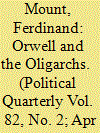

|
|
|
|
|
| Publication |
2011.
|
| Summary/Abstract |
The unique quality of George Orwell's political journalism is to force us to examine not just the utterances of our opponents, but what we say ourselves, in particular how we deceive ourselves as well as deceiving others. What would Orwell diagnose as our major self-deception if he were alive today? Orwell was much taken with James Burnham's 1941 bestseller The Managerial Society. He agreed with Burnham that the predominant drift in modern society was towards oligarchy, and not towards democracy as we like to flatter ourselves. Whether in business or politics, decisions today rest in fewer hands. Power is concentrated, not dispersed. As in Russia, the emerging system enables oligarchs to collar a disproportionate share of the rewards. Management becomes a self-remunerating elite. Inequality of income increases sharply as a result. Oligarchy is a perversion of liberal capitalism and not a natural development of it. It can be reversed. The Coalition government has set out in a liberal and localist direction. It remains to be seen whether these promising signs will develop into a sustained and effective programme.
|
|
|
|
|
|
|
|
|
|
|
|
|
|
|
|
| 11 |
ID:
105874
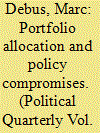

|
|
|
|
|
| Publication |
2011.
|
| Summary/Abstract |
The question of 'who gets what?' is one of the most interesting issues in coalition politics. Research on portfolio allocation has thus far produced some clear-cut empirical findings: coalition parties receive ministerial posts in close proportion to the number of parliamentary seats they win. This article poses two simple questions: Why did the Conservatives and Liberal Democrats agree to form a coalition government and, secondly, did the process of portfolio allocation in the United Kingdom in 2010 reflect standard patterns of cabinet composition in modern democracies? In order to answer these questions, a content analysis of election manifestos is applied in this article in order to estimate the policy positions of the parties represented in the House of Commons. The results show that a coalition between the Tories and Lib Dems was indeed the optimal solution in the British coalition game in 2010. When applying the portfolio allocation model, it turns out that the Conservatives fulfilled the criteria of a 'strong party', implying that the Tories occupied the key position in the coalition game. On account of this pivotal role, they were ultimately able to capture the most important ministries in the new coalition government.
|
|
|
|
|
|
|
|
|
|
|
|
|
|
|
|
| 12 |
ID:
105867


|
|
|
|
|
| Publication |
2011.
|
| Summary/Abstract |
That progressive taxation might offset a disproportionate burden of indirect taxes upon low income households sits at the heart of a suggestion from Friedrich Hayek. This concerns the manner in which a degree of progression might be accommodated and constrained to preclude arbitrary tax hikes upon minority income groups. While Hayek's proposal is permissive of socialist aims, it looks for efficiency in resource usage as reflected in the aspiration 'that each should feel that in the aggregate all the collective goods which are applied to him are worth at least as much as the contribution he is required to make'.
|
|
|
|
|
|
|
|
|
|
|
|
|
|
|
|
| 13 |
ID:
105861


|
|
|
|
|
| Publication |
2011.
|
| Summary/Abstract |
Britain urgently needs a national conversation about the economic, political and moral predicament it now faces. It should start with the economic crisis of 2008-09. Keynesians and neoliberals alike still seek to return to pre-crisis business as usual, albeit with modifications. But the untamed capitalism that came to grief in 2008 had three major flaws. First, it undermined the public domain of equity, citizenship and civic virtue, whose creation was one of the great achievements of the late-nineteenth and early-twentieth centuries, exposing it to invasion by the market domain. Second, it led to a remorseless rise in inequality of resources and life chances, rendering British society one of the most dysfunctional in Europe. Third, it encouraged the emergence of a debased form of democracy, best called 'market populism', that mocks the dream of political equality that lies at the heart of the democratic ideal. Yet growth points of a better society can be detected amidst the gloom. Informal institutions and social movements like London Citizens and the burgeoning environmental movement show that the notion of the public good is still alive. So do the survival of Edmund Burke's communitarianism in the conservative tradition, of John Stuart Mill's social liberalism in the liberal tradition and of ethical socialism in the social-democratic tradition.
|
|
|
|
|
|
|
|
|
|
|
|
|
|
|
|
| 14 |
ID:
105870
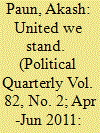

|
|
|
|
|
| Publication |
2011.
|
| Summary/Abstract |
Coalition government is an unfamiliar experience for Whitehall and Westminster. All actors are still adapting to the rules of this new political game. A number of governance challenges confront the United Kingdom's Conservative-Liberal Democrat coalition. It must strike a balance between the visions of two distinct parties and blend these into a coherent strategy for government. Like any government, it will expect to resolve most differences internally and then to show a united face to the world. Effective consultation and dispute-resolution processes within the executive will therefore be at a premium. But the separate political identities of the two parties also need to be preserved, and sufficient resources must be provided to each side within the government to enable this to happen. This article assesses the response of the coalition to these challenges in its first six months and draws lessons from relevant international experience.
|
|
|
|
|
|
|
|
|
|
|
|
|
|
|
|
| 15 |
ID:
105860


|
|
|
|
|
| Publication |
2011.
|
| Summary/Abstract |
The argument of this lecture speaks directly to the history of The Political Quarterly and the London School of Economics. It is that the European left is losing elections on an unprecedented scale because it has lost control of the political agenda to a newly flexible right; but it is also losing key arguments about how to nurture human values in today's connected and competitive global village because it has not responded to changes in economy and society; and that to turn things round it needs to address both its deficit in ideas and organisation.
|
|
|
|
|
|
|
|
|
|
|
|
|
|
|
|
|
|
|
|
|